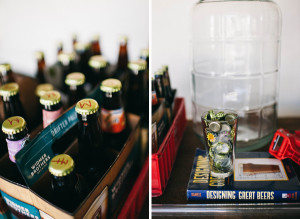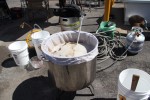 Homebrewers come in all shapes and sizes. From the minimal stovetop one gallon extract brews to those that have an all-grain automated superstructure that some microbreweries may even lust over, we all have one thing in common: we like to make and drink good beer. Whether you’ve brewed one batch or you’re well into triple digits, your equipment, technique, and experience are going to be different from the next person’s. From the beginning stages of brewing extract to the fine art of all-grain, you have to start somewhere.
Homebrewers come in all shapes and sizes. From the minimal stovetop one gallon extract brews to those that have an all-grain automated superstructure that some microbreweries may even lust over, we all have one thing in common: we like to make and drink good beer. Whether you’ve brewed one batch or you’re well into triple digits, your equipment, technique, and experience are going to be different from the next person’s. From the beginning stages of brewing extract to the fine art of all-grain, you have to start somewhere.
If you’re new to homebrewing, I recommend starting off with doing a few extract batches to practice the basics of brewing. Once you’re on the brew-wagon, all-grain brewing is just a few steps away. Most people take the plunge into the netherworld (I mean wonderful world) of homebrewing by starting off with small batches of extract beer. Extract malt is basically a concentrated syrup or powder that contains all of the necessary fermentable sugars taken from the grain. When brewing all-grain, you are doing this yourself through the mashing and sparging process, in other words: soaking the grains and rinsing as many of those fermentable sugars off of them as possible. Though some may look down upon the brewing of extract beers, I think that there are some positive outcomes to the use of extract. The most important, in my opinion, is not the fact that it can make award-winning beer, but what it means in terms of a stepping stone. Think of extract as a gateway drug. Once you get hooked you’re only going to delve deeper into the abyss (in this case the world of homebrewing). As stated earlier, the vast majority of people start off brewing with extract. It’s easy. Without extract brewing, there would most likely be fewer homebrewers. Not many people would invest that much time, energy, and money into a hobby without some knowledge of the basics. Extract provides a simple way to enter into the homebrewing world, with the next (and best) step being all-grain brews.
That being said, once you’ve gotten a few extract batches under your belt, I urge you to take full control of your beer and brew all-grain. All-grain may be yet another monetary investment, but the outcomes are well worth it. Not just the fact that you are making great beer, but all-grain gives you a certain sense of parental pride. You created it. It is yours from start to finish. From water, grain, hops, and yeast to that wonderful, potable, delicious beverage known as beer. Assuming you already have the equipment to brew extract, there are only a few more necessities for an all-grain batch.
First and foremost you’ll need a 5 or 10 gallon cooler for use as a mash tun. You can use a square cooler, but I recommend getting a Gatorade style cylindrical cooler with a spigot, which you can find at Lowes for relatively cheap. In order to convert it into a mash tun you’ll need a stainless steel spigot and a false bottom. There are many types of false bottoms ranging from a long, thin mesh bazooka screen, to a manifold made out of PVC pipe. The purpose of the false bottom is so that the extraction of the fermentable sugars results in a nice liquid wort instead of a grainy mess. The conversion from cooler to mash tun is fairly simple and there are numerous tutorials online (here’s a good one http://www.homebrewtalk.com/wiki/index.php/Converting_a_cooler_to_a_mash_tun). Next, you’ll need a kettle big enough to boil all of your wort. If you’re doing a 5 gallon batch, you’ll need a 7 or 8 gallon kettle. Unlike extract, all-grain batches require you to boil all of the wort instead of adding water at the end to bring up the volume.
All-grain brewing may seem daunting, but as with most anything, practice makes perfect. Perfect being a relative term in this instance since even the most experienced homebrewer will attest to the fact that there will always be imperfections in your beer, no matter how slight. All-grain brewing is an art. It is a beautiful testament to the subtle complexities that are found in each and every pint. Take control of your beer and make it your own.





